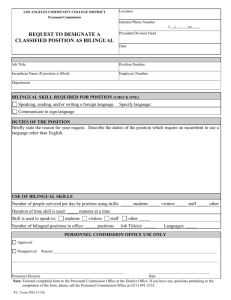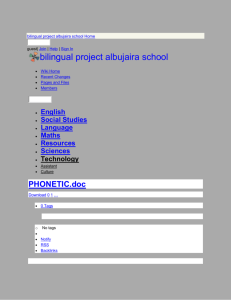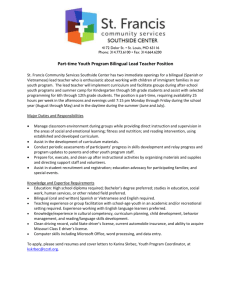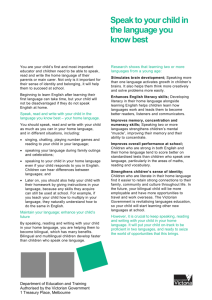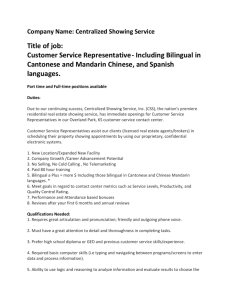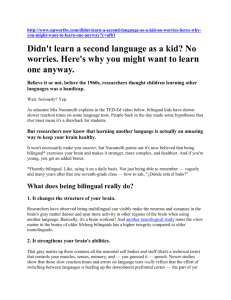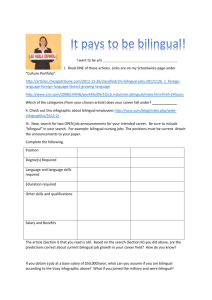Living in Two Worlds
advertisement
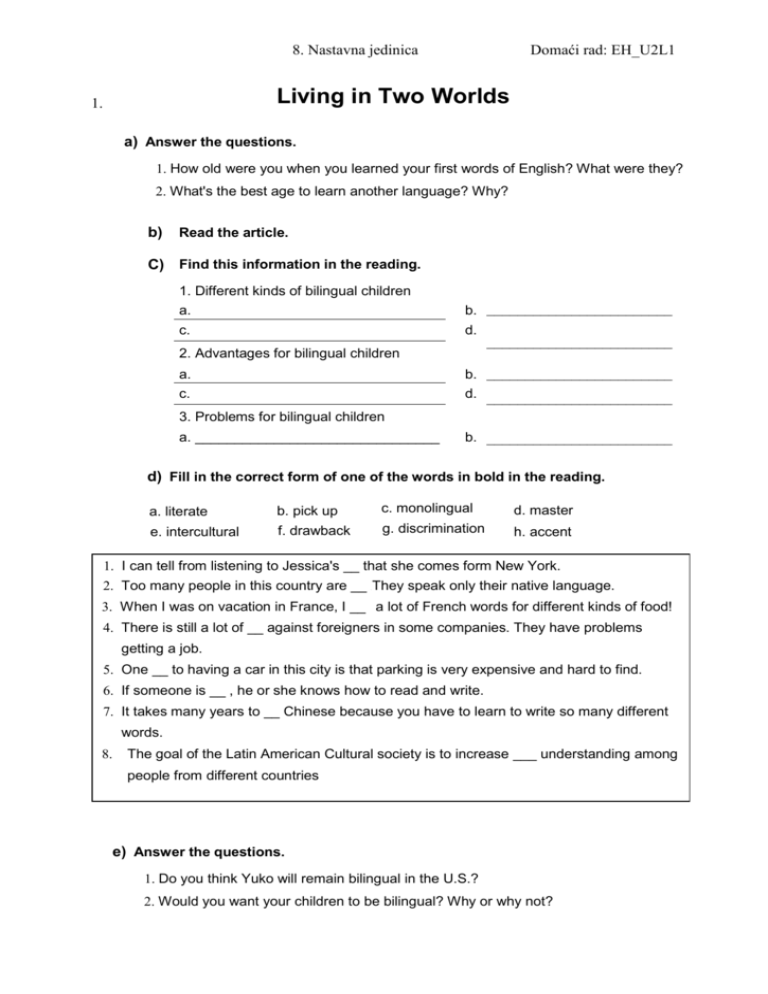
Domaći rad: EH_U2L1 8. Nastavna jedinica Living in Two Worlds 1. a) Answer the questions. 1. How old were you when you learned your first words of English? What were they? 2. What's the best age to learn another language? Why? b) Read the article. C) Find this information in the reading. 1. Different kinds of bilingual children a. b. ________________________ c. d. 2. Advantages for bilingual children ________________________ b. ________________________ d. ________________________ a. c. 3. Problems for bilingual children a. _______________________________ b. ________________________ d) Fill in the correct form of one of the words in bold in the reading. a. literate e. intercultural b. pick up c. monolingual d. master f. drawback g. discrimination h. accent 1. I can tell from listening to Jessica's __ that she comes form New York. 2. Too many people in this country are __ They speak only their native language. . 3. When I was on vacation in France, I __ a lot of French words for different kinds of food! 4. There is still a lot of __ against foreigners in some companies. They have problems getting a job. 5. One __ to having a car in this city is that parking is very expensive and hard to find. 6. If someone is __ , he or she knows how to read and write. 7. It takes many years to __ Chinese because you have to learn to write so many different words. The goal of the Latin American Cultural society is to increase ___ understanding among 8. people from different countries . e) Answer the questions. 1. Do you think Yuko will remain bilingual in the U.S.? 2. Would you want your children to be bilingual? Why or why not? 8. Nastavna jedinica Domaći rad: EH_U2L1 Living in Two Worlds Yuko Kitada is very lucky. While most people work hard to learn a new language, she picks up dozens of new words every week without trying. She masters grammar rules without lessons, speaks confidently, and is developing a perfect accent. Yuko is two years old. She is learning English from her mother, Angela Baker, and Japanese from her father, Ken Kitada. Yuko has been bilingual from the very beginning. "Her first word was mama," said Angela. "But we didn't know if she was trying to say 'mother' in English, or 'food' in Japanese." Yuko now has a large vocabulary in both languages. A monolingual child knows 14,000 words by the age of six, and a bilingual child knows even more. Children in bilingual families start out using words from both languages together, using only one word for each thing. Later, they pick up the equivalent word in the other language, and learn which words fit together. "She's good with words a1ready," said Ken. "If I don't understand what she says in English, she changes to Japanese. If I still don't understand, she tries to explain. Last night we were looking out the window, and she pointed at something. She tried to say 'star,' but couldn't pronounce it. So she told me in Japanese: "It's next to the moon." There are many different types of bilingual families. Some children learn one language from their mother, and another from their father. Other children use one language at home and a different one at school. Bilingual kids may be literate in both of their languages, or read and write just one language. Growing up bilingual has practical advantages and personal I advantages, too. When they are young, many bilinguals enjoy having a "secret language" with their brothers and sisters. They say being bilingual makes family relationships closer. "My younger sister is the only person in the world who is just like me," says Alexa Davis. She is the daughter of a French mother and an American father, and grew up in Japan, where she attended public school from the age of six. Most bilinguals enjoy travel and meeting new people. And many bilinguals feel that their bicultural upbringing gives them a broader view of the world. There are also drawbacks, though. Many bilinguals grow up feeling different, and realize very early that other people are not like them. Children of intercultural marriages may experience discrimination from both sides. "It was kind of sad," says l8year-old Mari Yamada, whose father is Japanese and mother is British. "My friends in school assumed I couldn't really be Japanese because I didn't look the same as them." But overall, she says, being bilingual is a huge advantage. "If I have children I want them to be bilingual. And I hope I'll marry an English speaker." Meanwhile, two-year-old Yuko is working out two languages and two worlds. "We do worry about Yuko's identity," her mother says. "She really needs a bilingual play group, but there isn't one nearby. And we're moving to the United State s next year, so her schooling will be in English. It would be sad to see her lose her Japanese, but it's really up to her. If she finds other interests, we won't push her towards languages." But Yuko isn't worried. She has an important project this week: learning the names of insects. "Kamakiri," she explained to me, pointing to an enormous green one under a bush. "Big!"
